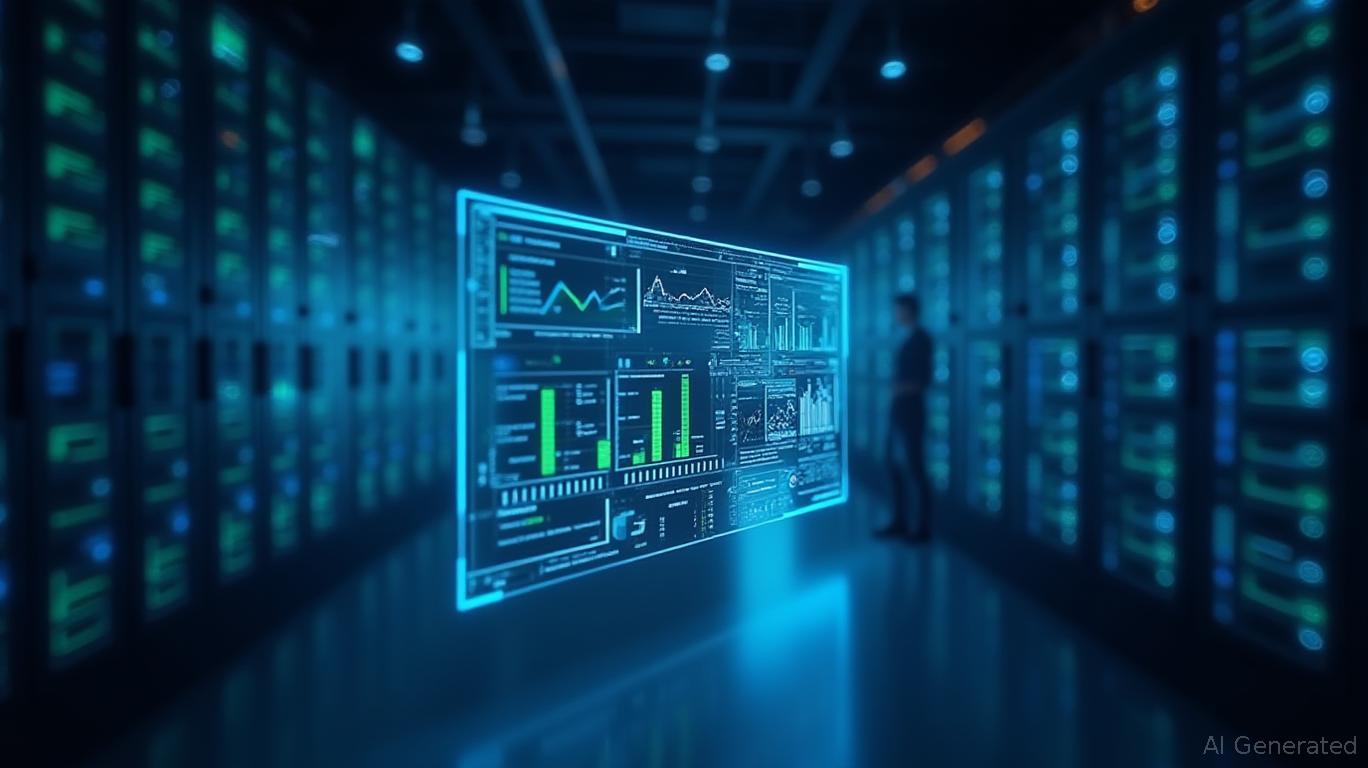Microsoft's AI Strategy Faces Power and Layoff Challenges
Last updated:

Edited By
Mackenzie Ferguson
AI Tools Researcher & Implementation Consultant
Satya Nadella, CEO of Microsoft, raises concerns about AI's massive energy consumption, emphasizing the need for responsible usage and practical societal benefits. As Microsoft plans layoffs, particularly in the Xbox and sales divisions, the company shifts focus towards more AI and cloud computing investments.
Table of Contents
- Introduction: Satya Nadella's Concerns on AI and Energy Consumption
- AI's Energy Footprint and Microsoft's Strategy
- Impact of AI on Job Market and Microsoft's Restructuring
- Societal Benefits of AI and Nadella's Vision
- Expert Opinions: Balancing Innovation with Sustainability
- Public Reactions to Microsoft's AI Strategy
- Future Economic, Social, and Political Implications
- Conclusion: Navigating the Challenges and Opportunities of AI
Introduction: Satya Nadella's Concerns on AI and Energy Consumption
Satya Nadella, the esteemed CEO of Microsoft, has taken a principled stand on the issue of artificial intelligence's (AI) energy consumption. During his recent address at Y Combinator's AI Startup School, Nadella underscored the importance of balancing AI's energy demands with its tangible benefits to society. He highlighted the pressing need for the tech community to exercise prudence in energy usage, ensuring that AI's expansion is aligned with the broader goal of enhancing societal welfare (source).
In his nuanced discourse, Nadella didn't merely caution against AI's vast energy appetite; he set forth a vision where technology serves humanity's essential needs. By advocating for AI's role in sectors such as healthcare, education, and efficient administrative processes, he emphasized its capacity to improve life quality and accessibility (source). This focus on meaningful application is intended to justify the energy costs associated with AI development.
Nadella's remarks are particularly timely in light of Microsoft's ongoing internal adjustments, which include strategic layoffs to bolster AI and cloud computing initiatives. This realignment reflects a broader industry trend towards prioritizing high-impact tech sectors that promise future growth and sustainability (source). Despite the challenges, Nadella's comments resonate deeply, calling for technological advancements that do not compromise our planet's resources, thus ensuring a responsible path forward for innovation.
In essence, Nadella is championing a cause that intertwines technological progression with ethical stewardship. His stance calls for a reevaluation of AI strategies, urging the integration of energy-efficient practices and the pursuit of "social permission" to harness AI's power (source). This discourse not only places Microsoft at the forefront of responsible tech development but also inspires a global dialogue on sustainable AI utilization.
AI's Energy Footprint and Microsoft's Strategy
The increasing energy demands accompanying artificial intelligence advancements have become a pressing concern for Microsoft and the broader tech community. Satya Nadella, the CEO of Microsoft, has highlighted AI's significant energy consumption, urging the industry to use energy judiciously. Nadella's remarks came during an address at Y Combinator's AI Startup School, where he underscored the necessity of ensuring that AI's energy footprint is justified by its societal benefits. He pointedly remarked that while AI offers transformative potential, its deployment should not exacerbate environmental challenges .
Nadella's strategy for Microsoft reflects a commitment to reducing AI's environmental impact while simultaneously enhancing its practical applications to benefit society at large. He has advocated for AI solutions that improve efficiency across various sectors, notably in healthcare and education. By streamlining processes such as hospital discharges and administrative tasks, AI can significantly reduce operational costs and conserve energy, thus aligning technological innovation with sustainable practices .
In pursuit of a more sustainable future, Microsoft is aiming to make its data centers carbon-negative, water-positive, and zero waste by 2030. This ambitious goal is part of their broader strategy to leverage AI to reduce energy consumption through smart optimizations and innovative technologies. The company envisions a future where technological advancements contribute meaningfully to addressing global environmental issues while driving economic growth .
Furthermore, Microsoft's strategic restructuring, marked by significant layoffs, especially in sales and the Xbox gaming divisions, is a reflection of its emphasis on prioritizing AI and cloud computing investments. Nadella's approach is a testament to the company's commitment to aligning with industry trends that focus on high growth and high impact solutions. However, this shift has also led to public discourse about job security, highlighting the delicate balance between embracing innovation and ensuring workforce stability .
Impact of AI on Job Market and Microsoft's Restructuring
The impact of artificial intelligence (AI) on the job market is multifaceted, affecting industries worldwide. Microsoft's recent restructuring highlights a trend towards prioritizing AI and cloud computing, which is reshaping workforce needs. As AI technology advances, traditional roles are being redefined, creating a demand for new skill sets that focus on computational and data-driven expertise. This shift is evident in Microsoft's strategic move to align its resources towards high-growth areas, prompting layoffs in divisions like Xbox and sales. Such changes emphasize the growing influence of AI in steering business decisions and shaping the future of work, urging workers to adapt to an increasingly automated landscape.
In a recent statement, Microsoft's CEO Satya Nadella addressed the substantial energy consumption associated with AI technologies, urging the tech industry to pursue sustainable practices. The company consumed about 24 terawatt-hours of electricity in 2023, underscoring the environmental impact of AI operations. Nadella's call for 'social permission' to utilize energy resources highlights a crucial balance between innovation and sustainability. He stresses that AI's energy expenditure must be justified by tangible societal benefits, such as improving healthcare, education, and administrative efficiency. These remarks come as Microsoft explores ways to make its data centers carbon negative by 2030, demonstrating its commitment to integrating sustainable practices in AI development.
Microsoft's restructuring plans include significant layoffs aimed at streamlining operations and doubling down on AI and cloud computing investments. This move is part of a broader strategy to position Microsoft as a leader in AI innovation while also addressing environmental concerns. Nadella's comments at Y Combinator's AI Startup School reflect a growing awareness of the ethical implications of AI, especially concerning its impact on the workforce. The restructuring signals a shift towards a more agile and resilient business model that can adapt to technological changes and societal expectations, focusing on AI's practical applications to justify its energy use.
The implications of AI's growth extend beyond Microsoft, affecting the broader tech industry. Nadella's warnings serve as a reminder of the ethical considerations that accompany technological advancement, particularly the environmental footprint of expanding AI capabilities. As companies like Microsoft push forward with AI integration, they are increasingly being held accountable for ensuring that the societal benefits of AI outweigh its environmental costs. This shift in responsibility is not just a business imperative but also a societal one, as public acceptance of AI will depend largely on its alignment with broader environmental and ethical standards.
Public reactions to Microsoft's restructuring and Nadella's comments on AI's energy use are mixed. While some commend the focus on practical AI applications and responsible energy usage, others express concerns over job security and economic inequality. The tech industry's challenge is to balance innovation with sustainability while addressing the potential displacement of traditional jobs. As AI continues to reshape industries, the development of effective retraining programs and policies will be crucial in mitigating economic disruptions and ensuring equitable access to new opportunities created by AI.
Societal Benefits of AI and Nadella's Vision
Artificial Intelligence (AI) has emerged as a transformative force with the potential to bring substantial societal benefits. Microsoft CEO Satya Nadella envisions AI as a powerful tool that, when harnessed responsibly, can significantly improve various domains, including healthcare, education, and administration. One of the key societal benefits of AI lies in its ability to streamline complex processes, thus enhancing efficiency and reducing costs. In the healthcare sector, for example, AI can assist in diagnostics and patient management, potentially improving outcomes and saving lives. Similarly, in education, AI tools can offer personalized learning experiences, catering to the unique needs of each student and improving educational outcomes overall. Nadella's vision emphasizes the practical applications of AI, advocating for its deployment in ways that directly contribute to societal progress rather than merely advancing technological capabilities.
Satya Nadella's vision for AI is not just about technological advancement but also about ensuring that AI's energy consumption aligns with its societal benefits. He has pointed out the significant energy demands of AI systems, which must be justified by their contributions to society. According to a report from Zee News, Nadella has cautioned the tech industry to be mindful of AI's power consumption, urging it to focus on applications that bring tangible societal value (source). This focus on energy efficiency and responsible use is crucial, not just for mitigating environmental impact but also for ensuring that AI developments are sustainable and beneficial in the long term. Nadella's insights reflect a growing awareness in the tech industry of the need to balance innovation with sustainability and ethical responsibility.
Furthermore, Nadella's emphasis on AI's role within society underscores a broader narrative of technology being in service to humanity. This aligns with Microsoft's broader strategic focus on AI and cloud computing, even as the company undergoes restructuring and potential layoffs. By prioritizing practical AI applications, Microsoft aims to leverage technology to solve real-world problems, thus augmenting its societal impact. Nadella's vision further includes using AI to tackle pressing global challenges, such as climate change, by improving energy efficiency and reducing carbon footprints. By 2030, Microsoft plans to run its data centers on 100% renewable energy, aiming to become carbon negative (source). This commitment illustrates how AI can contribute to sustainable practices, reflecting a future where technology and environmental responsibility go hand in hand.
Nadella's approach to AI also highlights the societal shifts that such technology can initiate. By automating routine tasks, AI can afford more time for creative and strategic human pursuits, potentially reshaping job landscapes. However, this advancement comes with the need for retraining and reskilling the workforce to thrive in an AI-driven economy. According to Indian Express News, there is a strategic aspect to Microsoft's ongoing restructuring, focusing on AI as a growth engine after recent job cuts in certain sectors (source). Nadella's perspective is a nuanced one that acknowledges the disruptions alongside the opportunities AI presents, advocating for a balanced approach that considers both economic growth and the ethical implications of technological advancements.
Expert Opinions: Balancing Innovation with Sustainability
In a recent reflection on the role of technology in sustainable development, industry experts are continuously debating the need to balance high-paced innovation with environmental consciousness. Microsoft's CEO, Satya Nadella, recently brought attention to this equilibrium, emphasizing the vast energy consumption associated with artificial intelligence (AI). His remarks highlight the need for technological advancements to serve practical benefits while minimizing their ecological footprint. Nadella advocates that the energy AI consumes must be justified by the tangible improvements it brings to society, such as advancements in healthcare and education. This perspective is gaining traction among IT leaders, as the industry grapples with enhancing societal contributions while reducing its carbon footprint. To build on this narrative, Microsoft has committed to making its data centers carbon negative by 2030, showcasing a robust plan to harmonize technological and environmental goals. More details on Nadella's insights during a recent tech event can be read here.
The discourse around AI's environmental implications points to a necessary strategic realignment in tech companies' operations, as highlighted by expert analyses following Nadella’s address. By prioritizing AI and cloud computing, companies like Microsoft are redefining their approaches to innovation. This shift demands a reevaluation of resource allocation to ensure that technological progress does not come at the expense of environmental sustainability. Microsoft's plan for sustainable data centers represents a conscientious attempt to foster innovative solutions that align with ecological and economic sustainability. Many experts agree that while AI holds promise for transformative impacts across various sectors, the tech industry must diligently work to offset the collateral environmental degradation. For a deeper dive into Microsoft's strategy and technological foresight, see the article here.
Public Reactions to Microsoft's AI Strategy
Microsoft's recent strategic moves have sparked varied reactions from the public, reflecting a complex landscape of opinion regarding technological advancement and social responsibility. The company's focus on AI, particularly as part of its newly defined strategy, has placed significant emphasis on energy consumption and sustainability. CEO Satya Nadella's warnings about the excessive energy use of AI were positively received by environmental advocates who appreciate the push for responsible tech development. By highlighting the practical benefits of AI, especially in healthcare and education, Nadella's comments resonated with those who value the societal impact of technological innovation. According to Zeenews, Nadella has underscored the need for AI to prove its value through tangible social contributions.
However, not everyone shares this optimistic view. Critics have pointed out the potential pitfalls associated with Microsoft's AI strategy as it relates to job security, particularly in light of planned layoffs. The proposed restructuring, which will largely affect Microsoft's Xbox and sales divisions, has sparked anxiety among employees and raised questions about the broader implications for the job market. On platforms like Reddit and LinkedIn, the discourse has been less favorable, as many fear the ripple effects of automation on employment. As Zeenews reports, the move is part of a broader strategy to prioritize investments in AI and cloud computing, a decision not without its share of controversy.
Public sentiment also touches on environmental considerations, with some factions criticizing AI's heavy energy demands and its potential ecological ramifications. There is a growing call for technology companies like Microsoft to further innovate in ways that lessen environmental impact, a notion that aligns with Nadella’s vision of operational transformation towards carbon negativity. This environmental focus has been met with praise by stakeholders who advocate for sustainable development in tech, underscoring how crucial it is for AI's progress to be aligned with ecological responsibility and societal needs.
The reactions to Microsoft's AI strategy also reflect a broader industry trend where technological advancement must be paired with ethical consideration. Nadella's call for "social permission" to continue expanding AI's footprint is a testament to the balancing act companies face between innovation and sustainability. Microsoft's commitment to using AI for real-world problem solving, especially in sectors requiring efficiency and cost reduction, has been lauded by those interested in the long-term benefits of AI. Yet, this same commitment has equally highlighted the ethical dilemmas faced in managing AI's growth, energy consumption, and its potential societal disruptions.
Future Economic, Social, and Political Implications
As we navigate the rapid advancements in artificial intelligence (AI), the future holds profound economic, social, and political implications that merit serious consideration. Satya Nadella, the CEO of Microsoft, has recently illuminated the sheer scale of energy consumption associated with AI technologies. According to him, the tech industry must prioritize energy efficiency and ensure that the societal benefits of AI justify its environmental impact. This perspective underscores the pressing need for innovations that balance technological growth with sustainable practices [1](https://zeenews.india.com/technology/ai-s-power-problem-satya-nadella-warns-tech-world-to-use-energy-wisely-as-microsoft-plans-more-layoffs-2923813.html).
Economically, the high energy demands of AI technologies could lead to increased costs and necessitate re-allocation of resources. Nadella's warning suggests that large-scale utilization of AI might pressure existing energy infrastructures, potentially causing hikes in electricity prices and further complicating energy crises. Concurrently, the shift towards AI-driven industries foretells significant job restructuring, with potential job displacement in certain sectors and the creation of new roles in AI development. While this transition could stimulate economic growth, it could also exacerbate inequalities if key economies fail to implement effective reskilling programs [1](https://zeenews.india.com/technology/ai-s-power-problem-satya-nadella-warns-tech-world-to-use-energy-wisely-as-microsoft-plans-more-layoffs-2923813.html).
Socially, the integration of AI has spurred ethical debates about its environmental impact and the necessity for 'social permission' to use such extensive energy resources. Nadella's insight emphasizes the importance of gaining public trust through transparency and accountability, which is crucial for broad acceptance and support. As AI technologies continue to permeate daily life, they have the potential to transform healthcare and education by improving efficiency and accessibility, bringing societal benefits that must be weighed against environmental costs [1](https://zeenews.india.com/technology/ai-s-power-problem-satya-nadella-warns-tech-world-to-use-energy-wisely-as-microsoft-plans-more-layoffs-2923813.html).
Politically, the economic power and influence of AI-centric companies raise questions about regulation and control. Governments worldwide may need to devise policies to manage AI's energy demands effectively and ensure social equity amid technological transitions. The global nature of AI advances necessitates international cooperation to tackle associated challenges and distribute benefits fairly across nations. As AI technology becomes a pivotal industry driver, nations capable of harnessing its potential could significantly shift global power dynamics [1](https://zeenews.india.com/technology/ai-s-power-problem-satya-nadella-warns-tech-world-to-use-energy-wisely-as-microsoft-plans-more-layoffs-2923813.html).
Ultimately, Satya Nadella's comments are a call to action for responsible innovation. They highlight the need for multidisciplinary collaboration to address the economic, social, and political implications of AI. By fostering cooperation among governments, industry leaders, and society, we can navigate AI's vast potential and challenges, ensuring that technological advancements lead to sustainable and equitable growth [1](https://zeenews.india.com/technology/ai-s-power-problem-satya-nadella-warns-tech-world-to-use-energy-wisely-as-microsoft-plans-more-layoffs-2923813.html).
Conclusion: Navigating the Challenges and Opportunities of AI
In navigating the challenges and opportunities of AI, the importance of sustainable practices stands out as a key focal point. Microsoft's CEO, Satya Nadella, recently urged the tech industry to be mindful of AI's significant energy consumption. This is highlighted by the company's aim to align AI development with Microsoft's broader environmental goals, such as making their data centers carbon-negative by 2030. As technology advances, energy-efficient AI solutions become imperative to balance innovation with environmental responsibility. Nadella's remarks at Y Combinator's AI Startup School emphasize AI's role in society, calling for its energy use to yield real-world societal benefits that justify the environmental cost .
Moreover, the societal impacts of AI cannot be overlooked. As AI continues to redefine industries, it raises both challenges and opportunities regarding workforce dynamics. The potential for job displacement due to increased automation is a concern that necessitates proactive measures. Microsoft's own restructuring efforts, with anticipated layoffs, underline the need to invest in retraining and reskilling programs to mitigate these effects . Such initiatives are crucial to ensuring that the workforce adapts to and thrives amidst the ongoing technological evolution, transforming challenges into new economic opportunities.
Furthermore, AI presents transformative potential across various sectors, particularly in healthcare and education. Nadella's vision includes AI applications that streamline administrative tasks to enhance efficiency, reduce costs, and ultimately serve societal needs. These innovations promise improvements in service delivery, accessibility, and outcomes, reflecting AI's capacity to engender positive social changes when aligned with ethical and responsible practices . As societies continue to respond to the integration of AI, it becomes crucial to focus on ensuring equitable access to these technologies, thus maximizing their potential benefits for all stakeholders.
The political dimension also plays a vital role in shaping the deployment and regulation of AI technologies. Governments around the world face the challenge of crafting policies that encourage responsible AI development while managing its environmental and societal implications. This includes formulating strategies that address the energy consumption of AI operations and promote sustainable innovation practices. International collaboration and regulation are essential to balancing technological advancement with the global challenge of environmental sustainability .









 English (US) ·
English (US) ·